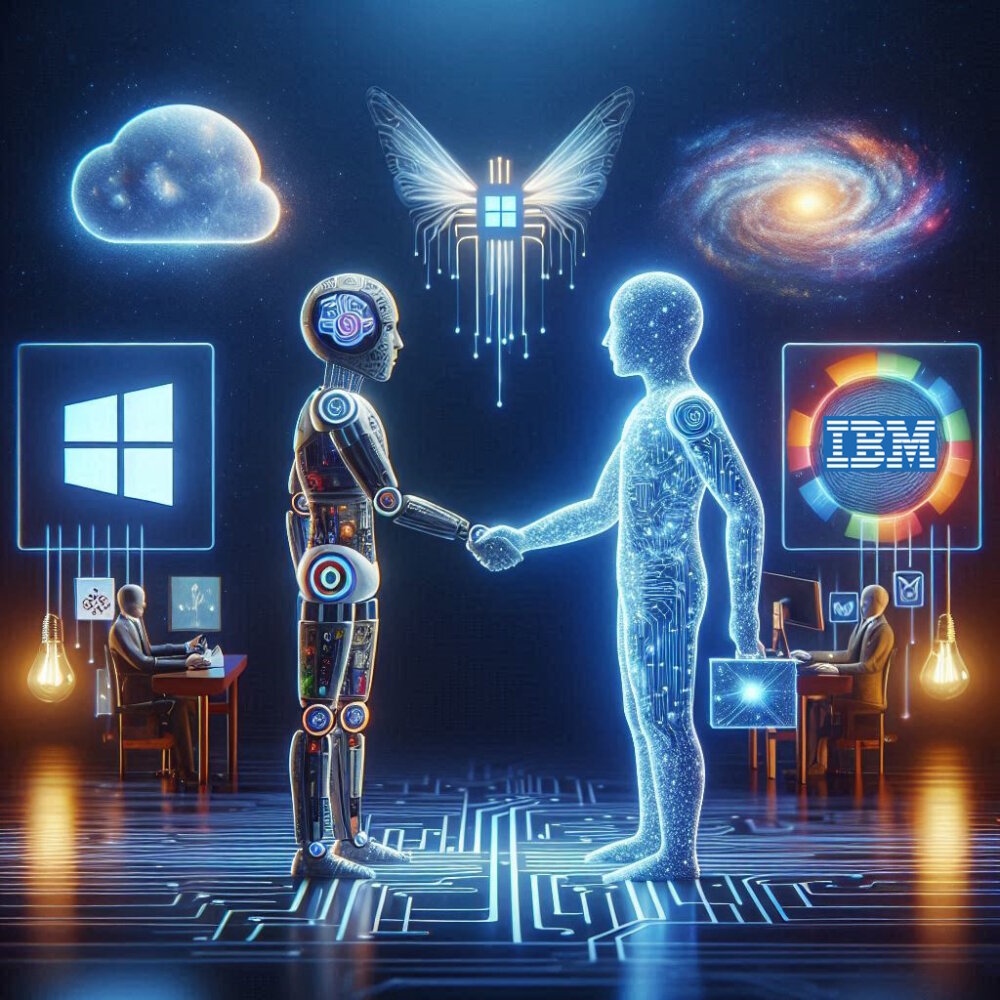
James New, VP Field Marketing at New Relic: “Marketers will become part technologists, part data analysts and part orchestrators of the digital customer experience”
If you read our article about bias in AI, you will know that AI image generators such as Midjourney continue to bake in a whole bunch of preconceived notions. Because if James New, VP of Field Marketing at New Relic, is any kind of example of an Australian marketer then Microsoft’s Designer – based on WALL-E 3 – gets it entirely wrong.

Rather than kangaroos, wild shirts and beaches, we think plain-speaking honesty should be in there – for, from our interviews with James and other Australian professionals, that’s what screams through. “Another non-negotiable is authenticity, embracing people as they are and empowering them to turn up as they are,” said James when we asked him to talk about his core values. “My team members do their best work because they can be their authentic selves.”
Not that James was born in Australia: he started his career in the UK, only moving to Australia in the early 2000s. He has spent the past 15 years in B2B tech marketing working for brands such as Citrix and Marketo and is now Global VP of Field Marketing at New Relic. It’s as big a job as it sounds, with James running enterprise demand generation, field events and account-based marketing (ABM) across the Americas, EMEA, Asia Pacific and Japan.
Little wonder that he is keenly aware of how technology can both help and hinder marketing professionals. “It’s not uncommon for marketers to be logging into upwards of 20 different marketing technology tools and platforms in their day-to-day roles,” he says. The time for consolidation is surely near, he argues.
Read on to discover James’ view on how marketing and technology will interact in the coming years, including the ever-increasing role of data.
Why Dust or Magic? That stems from a quote by legendary American advertising creative director, William Bernbach: “An idea can turn to dust or magic, depending on the talent that rubs against it.” (And if you’re wondering where you’ve heard the name, Bernbach was the inspiration behind Don Draper of Mad Men fame.)
Could you please introduce yourself to our audience? What motivated you to pursue a career in marketing, and how did you embark on your journey in this field?
My path to becoming a B2B tech marketer has been a less straightforward one. I started in e-commerce marketing in the UK, where I worked primarily with direct mail (home shopping) before the explosion of the internet. Upon moving to Australia, and discovering that the Australian e-commerce industry was still relatively immature, I made a move into sales for a global media company, selling digital marketing campaigns to B2B tech marketers. I held several roles and eventually assumed full divisional P&L responsibility, managing and developing account and interactive production teams.
When it was time to move back into marketing, this experience enabled me to transition into B2B tech marketing, including a stint in Martech which enabled me to upskill in marketing automation and personalisation. I am extremely grateful for the detour into sales as the opportunity has helped me bridge the traditional divide between marketing and sales, eventually becoming a stronger, more empathetic marketer. I still put those sales pitching skills to work every day in my current role running global field marketing for New Relic.
What are your thoughts on the escalating integration of AI in digital marketing and its potential influence on the future of marketing, Martech and social media?
It’s important to highlight that machine-based learning has been embraced by marketers for some time, with its earlier iterations applied to marketing automation and web personalisation platforms. With AI’s pervasive influence over the future, we can expect this to further improve and become more precise – with visitors, prospects and customers being served content and product offerings that are contextual and relevant to them at their stage in the buying journey. There are also immediate opportunities in digital marketing to drive greater value in production with AI and how marketers interact with technology.
While creativity and the human touch will always be key cornerstones for marketers solving business problems, as we apply AI across workflows, marketers will become part technologists, part data analysts and part orchestrators of the digital customer experience.
Do you anticipate any significant disruptions in marketing and sales technology for 2024? If so, what?
Marketers have a vast amount of technology available to us today, arguably too much. Scott Brinker of Chief Martec identified in 2023 that, on average, companies have 291 SaaS subscriptions. It’s not uncommon for marketers to be logging into upwards of 20 different marketing technology tools and platforms in their day-to-day roles and even as many as 50 in a working week.
I’ve felt for some time that there would be consolidation of vendors in the Martech industry, but failing that, I believe that marketing teams will start to consolidate the primary tools their teams use themselves to drive efficiencies in marketing execution.
In addition to the obvious rationale to consolidate and streamline tools, marketers will learn that they will see greater value from their tech investments when they go all-in on a key set of platforms, and plug the platforms into different functions beyond marketing to derive more returns and move the needle. This is similar to the world of IT engineering, where we are seeing an increasing move from multi-tool and fragmentation towards single, consolidated platforms in an effort to derive and demonstrate greater business value.
Related reading: AI copyright: should your business be worried?
How do you think AI might evolve B2B marketing and/or ABM strategies in 2024?
It’s universal knowledge that data will be more crucial than ever to B2B marketing. With this data, we can expect to see greater integration of traditional B2B demand (lead) generation and ABM (account-based marketing) as they become increasingly AI-driven – both to identify high-value prospects in an account and identify the right accounts to target.
Marketing will then use AI to create a single, unified view of the customer journey – enabling brands to deliver a more personalised and engaging experience to both the individual prospects and the overall target account seamlessly across all digital channels.
Could you share some of your most noteworthy accomplishments that you take particular pride in?
I have been especially proud of scaling our marketing operations in APAC over the past six years. In tech marketing, you tend to start in a region like APAC as the first on the ground, where you have to roll your sleeves up and make things happen in the first year or two across all disciplines from PR to demand gen and field events.
The efforts start to pay off when you get to build out your team with subject matter experts (SMEs) and can start to scale across the region. I have been able to go through that journey and today, in a global marketing role, I make sure APAC is at the forefront of collaborating with other geographies and driving economies of scale.
It has been a real source of accomplishment to see the shift from the approach where the bulk of ideas and campaigns came out of HQ in the US to where we see more multi-way collaboration than ever across our teams in Europe, Australia, Asia, India and Japan.
What core values have played a pivotal role in shaping your approach to marketing and communication?
I am a believer in being a player-coach where, while a leader, I am also a direct contributor to the team when it matters. However, I cannot state enough the importance of stepping back and coaching people to develop their own way of working and achieving shared goals. In marketing, we do like our workflows but it’s equally valuable to recognise when established workflows create more barriers to improvement and innovation. Instead, I believe in setting goals for my team members and serving as a guide and coach because I trust them to find a better way of doing things.
Another area that is key to my approach is to spend time managing up and across the wider organisation. Marketing happens to be a discipline that draws input and ideas from everyone, new or old to the organisation. It’s essential to make sure they are heard, but also to know when to draw the line, make the right decisions and explain your convictions as a marketing leader.
Another non-negotiable is authenticity, embracing people as they are and empowering them to turn up as they are. My team members do their best work because they can be their authentic selves. It’s also important to celebrate the teams’ achievements and let them be in the spotlight across the organisation.
Related reading: What will the digital landscape look like in 2028?
What major hurdles have you encountered as a marketing leader, and how did you surmount them?
I would say the biggest hurdles have also been my most valuable lessons. The switch in industry and gears throughout my journey, i.e. from e-commerce marketing to media sales and then back to marketing has allowed me to really understand what it’s like to be in sales (and many other functions in the organisation) and use that empathy to improve relationships and shared outcomes. This journey saw me pick up life-long transferable skills, such as the ability to zero in on data points, and cultivating leads and pipelines, all of which I still apply to global marketing today.
What piece of advice would you offer to fellow marketing leaders that has been particularly beneficial to you personally?
I have been fortunate to benefit from strong mentorship early on in my career. I remember a particular mentor telling me that to get the best out of your team, don’t micromanage but orchestrate. As marketing has evolved to become such a broad domain today, it is impossible to be an SME in all areas. Having the humility to ask for advice as well as hiring a deep bench of SMEs and trusting them to find better ways of doing things are the marks of a successful leader.
NEXT UP

Alexey Kalachik, CEO & Co-Founder at Fively: “The potential for digitalisation within insurance is enormous”
We interview serial entrepreneur Alexey Kalachik, CEO & Co-Founder at Fively, on the future of fintech and what makes this space so exciting for startups.

IBM bolsters AI push with Microsoft Copilot launch
In a bid to boost its AI offering, IBM Consulting will enable enterprises to create and manage AI copilots – including Copilot for Microsoft 365

Andrew Kay, Director of Systems Engineering APJ at Illumio: “The most worrying development with ransomware is that it has evolved from simply stealing data to impacting IT availability”
Andrew Kay, Director of Systems Engineering APJ at Illumio, has 20 years’ experience helping organisations strengthen their cyber resilience. We interview him as part of our Threats series on cybersecurity.